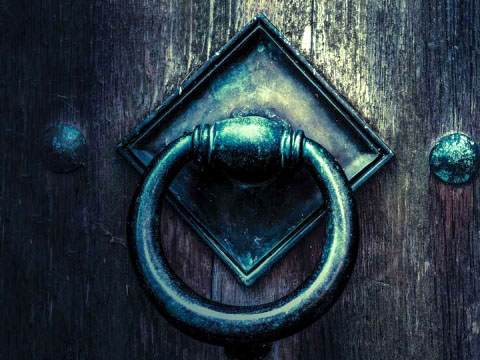The Forbidden Door by The Devil’s Violin is a rough diamond. It’s not exactly theatre as we know it. Instead, the show and the company seem belong to a much older tradition; a different type of performance. Namely, Storytelling.
Unlike, most theatre, it’s a bit stripped back. A bottle of Highland Springs close at hand; sheet music on the tiled floor; a chintzy cushion by way of a drum muffler. The intimate space lends itself well to the troupe’s no-thrills approach. It’s a homeliness that makes you hark back to the oral tradition, the “ancient art” (as the company say). It makes you feel rather like Jacob and Wilhelm Grimm must have felt, as they sat beside the fireplaces of old millers’ wives, collating their folklore.
The trio of musicians arrive, unfussy and informal. And even when the troupe’s frontman, Peter Morden (the “master storyteller” as The Guardian once said of him) stands up out of the crowd and shouts, there is still a sense of subtlety – of the almost anti-theatrical – as you’re invited to listen in.
The music, to begin with, is playful. Though the prologue – full of rhetoric and flowery analogies – does drag a little, it’s not long before you’re gripped. It’s something about Morden. He doesn’t exactly ooze personality in the same way a stand-up comedian might. And he doesn’t grip you with the colour or character of a monologue either. Instead, he’s more of a vehicle for the story itself; not quite a performance, but a telling. His sense of rhythm and timing is crucial. And (don’t get me wrong) Morden himself does enact particular moments beautifully. He creates a range of voices with his very soft Welsh accent. He really gets into it at points; he builds with the music, spits on the plosives and throws his whole slightly awkward body into the words. His dry humour is crucial too; it pierces the epic story with moments of light relief and plays upon the more surreal elements of folklore. At points this humour worked better than others. Morden improvised expertly, as a couple of latecomers caught his eye. And at points he stumbled a little – but, for what is essentially a 90 minute monologue (on the opening night of the tour no less) his skills are undeniably impressive.
Listening to him, and the music combined, it’s easy to get lost in the story. And, as with all theatre, the gaps are just as important as the filler; the pauses and silences, or musical interludes following passages of speech, help the audience to imagine and engage, painting whole sets and scenes within the mind which could not have otherwise been created.
The music moves from melodic to fragmented, to something like jazz. At points, it’s abetting the story wonderfully. At times it’s a little rough, with a bit of tuneless singing thrown in as well. It picks up in the second half of the play, as the musicians and Morden become in-sync. The only really dud note to come from the minstrels all night, was when they each performed a couple of short lines. It was just a little reminiscent of children in a school play – clunky and nervy.
The story itself is a fantastic mix of well-known fairly-tale motifs and new inventions. It shifts – or is shifted – seamlessly, from the gods and the cosmos to the familiar and domestic. As in the myths of Ancient Greece, gods roam the Earth and inhabit human forms. As in all good fairy-tales, familiar, pattern-building repetition is deployed and intercut with surprising twists and turns. Not one, but two epic quests are undertaken, grizzly sacrifices are made and the images and messages conjured by this magic act are as dark, as strange and as vivid as any of Hans Christian Anderson’s or Perrault’s.
In short, it’s a good tale and well performed. That seems reason enough to see it. After all, we should celebrate storytellers such as Morden and cherish that ancient tradition The Devil’s Violin upholds. ★★★☆☆ Chris White 04/02/15


